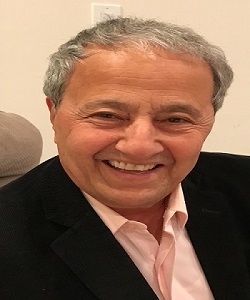
واشنطن– في منتصف الثمانينات ،أقامت سفارة لبنان في واشنطن حفلاً موسيقياً كبيراً بمناسبة عيد الاستقلال. كنت أنا و زوجتي من المدعوين، فزوجتي لبنانية ونحن من أصدقاء عائلة السفارة.
كان الحفل في مركز كندي المعروف في العاصمة واشنطن. وهو المركز الثقافي الأهم في إقامة واستضافة الأنشطة الثقافية في الولايات المتحدة كافة. حرصت السفارة على أن يكون الحفل غنياً بإبداعات لبنانية متنوعة لا تقتصر على مغنٍ أو عازف واحد. فقد كان للبيانو عازفه و للقانون و العود و الدربكة و الناي و حتى الاوبرا، كل كان له فنانه.
جلست أتوسط زوجتي و قريبة لها. لم تكن قريبتها تتقن من العربية سوى بضع كلمات منها : مرحبا، ستو، تبولة و كبة. لكنها أنصتت، و انسجمت، واستمتعت و صفّقت لكل الألحان، إذ لم تكن بحاجة إلى ترجمة النغم بل الاستماع والانسجام. و حين جاء دور المطرب اللبناني طوني حنا، و كان مشهوراً جداً في ذاك الزمن، والذي اختير على مايبدو من قبل معدي الحفل ليكون مسك الختام بقصد اختتام الحفل، كالعادة، بالوصول إلى أجواء الطرب و الرقص، بدأ يصدح بصوته الجبلي الجميل، ولأن الصبية لم تكن لتفهم ما يقوله، أصابها الملل وراحت تغط في نوم عميق، لم يوقظها منه إلا هتاف الحضور وصراخهم بصوت رجت له القاعة: الله …. الله ….. الله …
قفزتْ الصبية من مقعدها مذعورة وسألتني: ماذا حدث؟ لاشيء. الجمهور أخذه الطرب فصرخ. أجبتها. وماذا قال المطرب ليفعلوا ذلك ؟ سألتني ! قال ” ياليل يا عين” و مدّها طويلاً. أجبت . لكنها لم تقتنع بالجواب فعادت و سألت : وما ذا تعني ؟ ترددت قليلاً، إذ كيف اقولها بالانكليزي! لم يكن أمامي إلا الترجمة الحرفية. قلت معناها : “.Oh eye“OhNight
باستغراب تمتمت بالانكليزية : I cannot believe it” لا يمكنني تصديق ذلك”. عندها قلت لها : عودي إلى نومك! صعب أن تفهميها.
في الثامن عشر من شهر كانون الأول كان اليوم العالمي للغة العربية. قرأت في منشور اليونيسكو الخاص بهذه المناسبة لهذا العام ، وبلوحة جميلة كلمات ضمت ثمانية و ثلاثين معنى للحب في اللغة العربية، و تذكرت حينها أن هناك حوالي خمسمئة اسماً ووصف للأسد في هذه اللغة أيضاً. و تذكرت كم أنبّه طلابي أن وضع النقاط في موضعها الصحيح فوق أو تحت الحروف مهم جداً إذ قد يضعهم في مأزق محرج إن هم أخطأوا أو نسوا وضعها، ففي ذلك اختلاف للمعاني كبير.
يا ليل يا عين… و وضع النقاط في مكانها المناسب… بعض مما لهذه اللغة من شخصية لا تقاسمها بها أي لغة أخرى. هذه الشخصية التي أقف أحياناً عاجزاً أمام طلابي حين أُسأل عن معاني بعض مفردات سماتها في الانكليزية، ولا أجد ! أجيب: ليس لها مرادف.هي لغة التعجب : ويْ ! اسم فعل بمعنى أتعجب، كيف تنقلها إلى الانكليزية. هي لغة الوجع : آه ! اسم فعلٍ بمعنى أتوجع !! كيف تنقلها إلى الانكليزية. ! هي لغة الضجر! أفٍ ! اسم فعل بمعنى أتضجر .. كيف تنقلها إلى الانكليزية. هي لغة الانشراح : نعيماً! كيف تنقلها إلى الانكليزية وهي لغة الاختصار والاختزال و الحذف والتقدير !! كيف يغدو الحرف الواحد : ر … فعلا للأمر …
اعتدت أن أكتب زاويتي باللغتين العربية والانكليزية، ولكنني حين اخترت موضوع مقالتي هذه حول سمات “شخصية ” اللغة العربية ، وتفرد بعض كلماتها بمعانٍ ليس لها مرادفات في لغات أخرى، تساءلت هل اكتفي بالنص العربي ! أم أنني أحاول نقل ” روح” المعنى فقط!راقت لي الفكرة،و وجدت نفسي من الرضا أغمض عيني و أقول” خيْ “.وهنا استدركت، وأنا أنطق كلمة ” خيْ… “كم ستكون المهمة صعبة !
بوابة الشرق الأوسط الجديدة
“Oh Night, Oh Eye…Ya Layl Ya Yain
Rida Asaad,
Washington, DC
In the mid-1980s, the Lebanese Embassy in Washington, DC organized a grand musical event to celebrate Lebanon’s Independence Day. My wife and I were among the invitees, as she is Lebanese, and we were friends with the diplomats at the Embassy. The event took place at the renowned Kennedy Center in the U.S. Capital, Washington, DC, a cultural hub hosting various activities across the United States.
The Embassy took great care to ensure that the celebration was rich in Lebanese cultural heritage, featuring not only a singer but also various musicians and artists playing instruments such as the piano, kanun, oud, derbake, and even an opera singer. I was seated between my wife and her young niece who only knew a few Arabic words, like sitto, kibbeh, tabbouleh, falafel, hummus and of course marhaba. She seemed to be enjoying the music and the melodies immersing herself in the excitements and applauded when others did, without the need for any translation.
When the famous Lebanese singer Tony Hanna took the stage, chosen by the organizers to be the grand finale, leading into the traditional ‘Tarab, my wife’s niece, not understanding the lyrics, got bored and fell asleep. A while later the audience’s enthusiastic loud cheers that shook the hall as they chanted “Oh God, Oh God”. She jumped up from her seat scared crying out, ‘What happened?’ I replied, ‘Nothing. The audience was captivated by the song and cheered. ‘What did the singer say to make them scream this way?’ she asked. I hesitantly responded, wondering how do I really translate this into English other than the literal translation. ‘He said, ‘Oh night, oh eye”. She muttered in utter surprise and confusion, ‘I cannot believe it they made such an uproar for just that I told her “you better go back to sleep; it’s hard to explain”!
On the 18th of December, the International Day of the Arabic Language, I read a UNESCO post commemorating the occasion this year. It featured a beautiful illustration with thirty-eight synonyms for the word “love” in the Arabic language. It reminded me that there are about five hundred names or descriptions for the word “lion” in this language as well. I recalled how I emphasized to my students the importance of placing the ’dots’ correctly above or below letters, as misplaced or forgotten dots could lead to significant differences in meanings.
‘Oh night, oh eye,’ and placing the dots in the right places, are some of the unique characteristics of the Arabic language that is not shared with any other. Sometimes I find myself helpless when my students ask about the meanings of certain Arabic words in English, and I find none! Some of these words are a single letter or two letters with a full meaning expressing pain, wonder or exclamation as in ‘wa’, meaning I wonder; ‘Ah!’ meaning I’m in pain; ‘Uf’ meaning I’m frustrated… How do you translate that it into English when there are no comparable words? ‘Na’eeman!’ is an exclamation meaning delightful and used only when one takes a bath, shaves, or gets a haircut! How do you translate that into English? How does the single letter ‘Ra’ gives the meaning of the verb ‘look’
I got used to writing my column in both Arabic and English, but when I chose the topic of this article about the “unique characteristics” of the Arabic language with some words having no equivalents in other languages, I wondered whether I should stick to the Arabic text only or attempt to convey the “spirit” of this article in English. I liked the idea and felt relieved and satisfied to reach such a solution. Funnily, I found myself saying, ‘Khay.’ And here again, I realized, saying ‘Khay’, one of these unique words, would be quite challenging in English.
Great Middle East Gate




